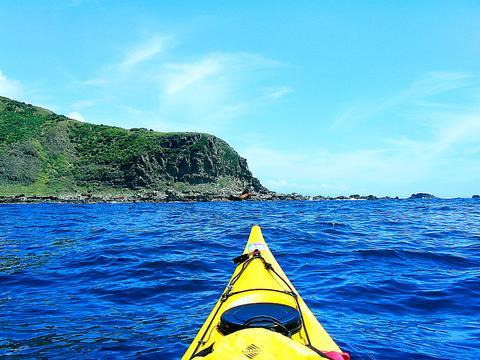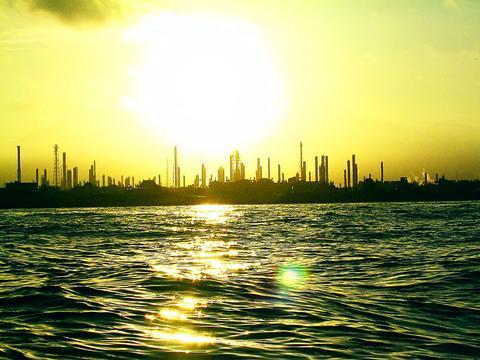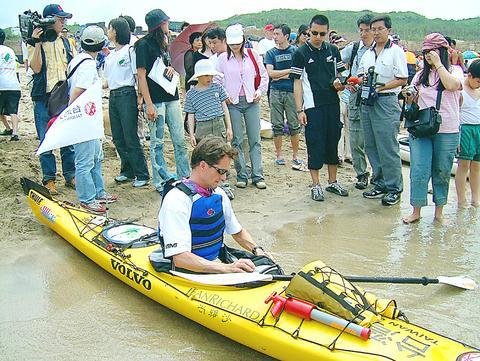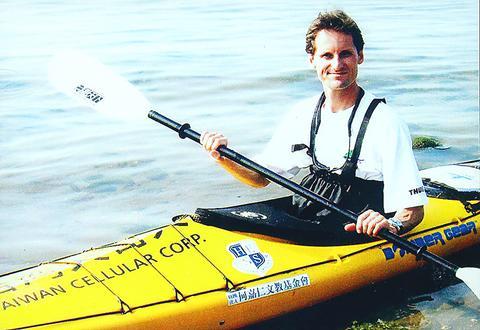There are easier ways to raise a couple million NT dollars for ecological conservation than circumnavigating Taiwan in a sea kayak. But they're not likely to interest Mark Western, a Canadian expat with a lust for adventure that he ingeniously turns into money for good causes, as with his Paddle Taiwan Project which is nearly complete and looks set to raise about NT$1.5 million for two local NGOs.
For his latest fund-raising adventure the 37-year-old pushed off the beach at Baishawan, Taipei County, on May 1 in a 4.8m sea kayak and began tracing a 1,100km counter-clockwise route around Taiwan. It's an endeavor that follows up on another ambitious scheme he led in 2000 called Taiwalk, which raised NT$4.2 million for orphans. Like his current self-imposed challenge, Taiwalk entailed circling Taiwan -- though on foot and on land.
Because it's at sea, the Paddle Taiwan Project raises the bar for pain and introduces a degree of danger that didn't exist in Taiwalk. In the past four weeks, Western has been dumped unceremoniously on a beach by a treacherous east coast shore break, he's been marooned on a sandbar 3km offshore and even found himself in the line of fire of military exercises. Then there are the more mundane, yet equally taxing, currents, waves and dangerous weather conditions all compounding the discomfort of non-stop physical exertion over weeks.

PHOTOS COURTESY OF PADDLE TAIWAN PROJECT
"It's been far more physically challenging than I had predicted. I trained for three hours twice a week before starting this, but that's nothing compared to paddling eight hours a day," said Western on Wednesday from Hualien in the short span between getting out of the water and collapsing for the night. "I'm feeling pretty lean."
Western has kept a journal of his trip that can be read on the project's Web site (http://www.paddle-taiwan.com http://www.paddle-taiwan.com/ ) and on the community Web site Forumosa. It provides a record of the emotional swings he's undergone, starting with exuberance on the first day's launch and then sinking into doubts about the whole project on the second day when he realized the insanity of paddling an average of 50km daily for a month on open waters. What is remarkable, though, is that despite the hardship and the frustration of falling almost a week behind due to typhoon Nida, Western remains generally upbeat.
"We lost time because of the typhoon. And then the past few days have been really tough, paddling all day into the wind. That really sucked," he said.

PHOTOS COURTESY OF PADDLE TAIWAN PROJECT
During his days on the water, Western said his mind works in three distinct ways. There's the physical one, "where I'm thinking about the heat, the rain, the wind, the pain." There's the mental one, "where I'm thinking about the past, the future and my family." And the spiritual realm, "Sometimes when I'm paddling time sort of stands still. Three hours can go by and it feels like three minutes."
Following Western on land is a two-person support team that stays in contact with him throughout the day and that monitors the global positioning system signal to track his movement along the coast. "The team on land might be even more tired than myself. [The logistics have] been a huge task for them," Western said.
Though the project is aimed at protecting Taiwan's coastal environments, Western says he spends little time gazing at the shores. "Yeah, the scenery is spectacular, but you can't look at it too much. It's like a great painting. After a while you still want to look at something else."

PHOTOS COURTESY OF PADDLE TAIWAN PROJECT
There hasn't even been much marine life to divert his attention, aside from some sea turtles and a few flying fish on the east coast. He had yet to see the whales and dolphins that people travel to Hualien to see.
As for the west coast, "the water is brackish, brown and really polluted. There's really very few places I'd want to spend time [on the west coast]. There are huge areas with break walls and stones and very few areas with access to the beach."
This is a situation that the two beneficiary NGOs of the project -- the Society of Wilderness and the Kuroshio Ocean Education Foundation -- seek to change. Donated funds will go toward seminars, open workshops, educational materials and beach clean-up activities that will initiate a debris monitoring system to identify and hopefully stop the source of pollution that washes onto Taiwan's beaches.

PHOTOS COURTESY OF PADDLE TAIWAN PROJECT
"I'm actually not a big environmental activist. I'm more of an outdoors person. Conservation of the coastline is just an issue that I think needs more attention in Taiwan."
Conservation isn't quite incidental to the project, but Western's single-minded pursuit of adventure inevitably dominates his experience. "I'm a very goal-oriented person. Once I get an idea, it's hard for me to put it aside." That's why he thinks his wife has encouraged him in the project. "She supports me because she knows that if I didn't do it, I'd be harder to live with. But she worries about my safety and the fact that I've taken a month off to play."
So, even after almost a month of agonizing paddling, he can still bring himself to say the tour of Taiwan on kayak is fun.
As of press time, Western was north of Hualien making good time for a final landing point at Baishawan next week. Donations for the Paddle Taiwan Project can be made through its Web site.

One of the biggest sore spots in Taiwan’s historical friendship with the US came in 1979 when US president Jimmy Carter broke off formal diplomatic relations with Taiwan’s Republic of China (ROC) government so that the US could establish relations with the People’s Republic of China (PRC). Taiwan’s derecognition came purely at China’s insistence, and the US took the deal. Retired American diplomat John Tkacik, who for almost decade surrounding that schism, from 1974 to 1982, worked in embassies in Taipei and Beijing and at the Taiwan Desk in Washington DC, recently argued in the Taipei Times that “President Carter’s derecognition

This year will go down in the history books. Taiwan faces enormous turmoil and uncertainty in the coming months. Which political parties are in a good position to handle big changes? All of the main parties are beset with challenges. Taking stock, this column examined the Taiwan People’s Party (TPP) (“Huang Kuo-chang’s choking the life out of the TPP,” May 28, page 12), the Democratic Progressive Party (DPP) (“Challenges amid choppy waters for the DPP,” June 14, page 12) and the Chinese Nationalist Party (KMT) (“KMT struggles to seize opportunities as ‘interesting times’ loom,” June 20, page 11). Times like these can

Dr. Y. Tony Yang, Associate Dean of Health Policy and Population Science at George Washington University, argued last week in a piece for the Taipei Times about former president Ma Ying-jeou (馬英九) leading a student delegation to the People’s Republic of China (PRC) that, “The real question is not whether Ma’s visit helps or hurts Taiwan — it is why Taiwan lacks a sophisticated, multi-track approach to one of the most complex geopolitical relationships in the world” (“Ma’s Visit, DPP’s Blind Spot,” June 18, page 8). Yang contends that the Democratic Progressive Party (DPP) has a blind spot: “By treating any

You can tell a lot about a generation from the contents of their cool box: nowadays the barbecue ice bucket is likely to be filled with hard seltzers, non-alcoholic beers and fluorescent BuzzBallz — a particular favorite among Gen Z. Two decades ago, it was WKD, Bacardi Breezers and the odd Smirnoff Ice bobbing in a puddle of melted ice. And while nostalgia may have brought back some alcopops, the new wave of ready-to-drink (RTD) options look and taste noticeably different. It is not just the drinks that have changed, but drinking habits too, driven in part by more health-conscious consumers and